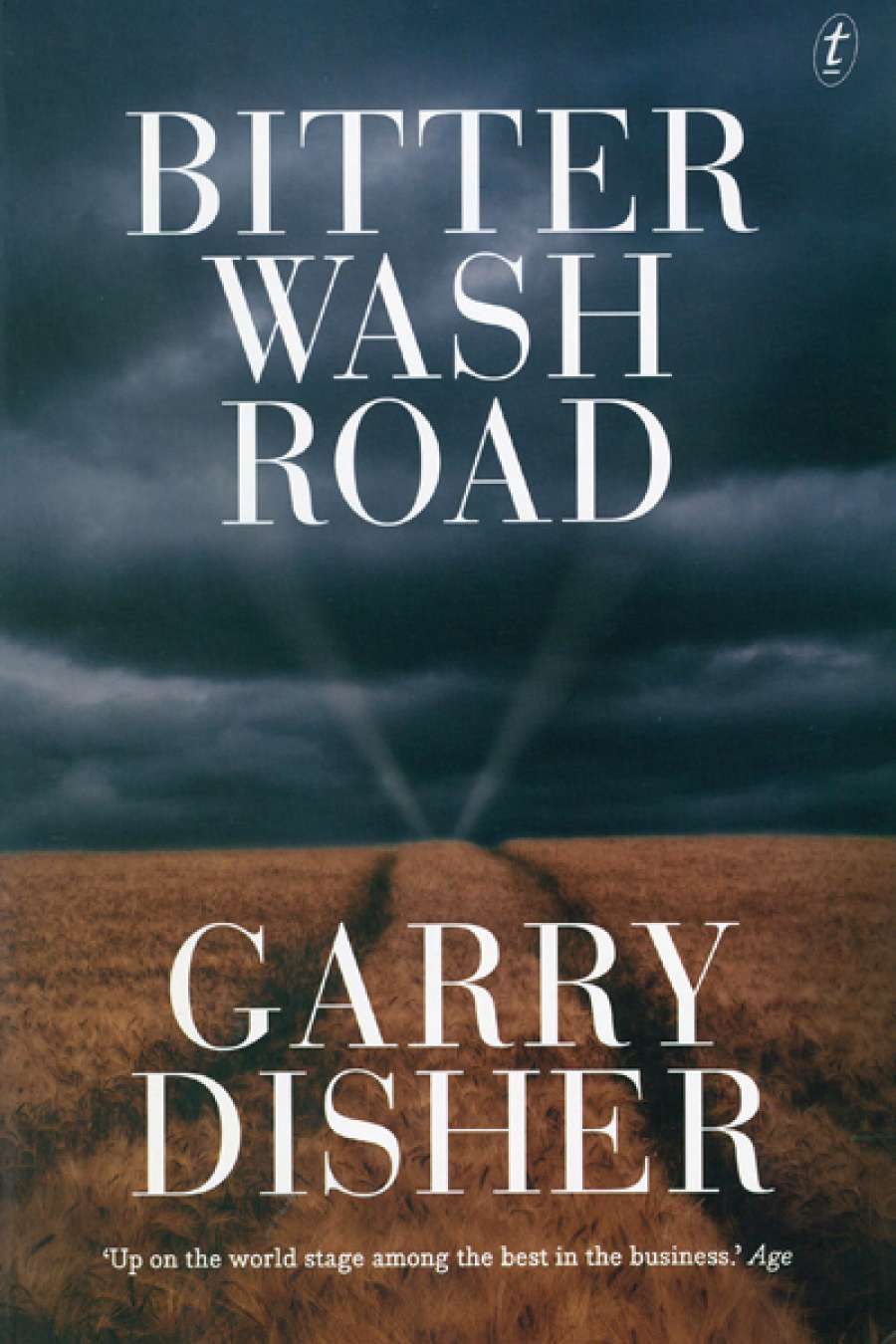
- Free Article: No
- Contents Category: Fiction
- Custom Article Title: Ray Cassin reviews 'Bitter Wash Road'
- Review Article: Yes
- Online Only: No
- Custom Highlight Text:
Garry Disher’s World War II novel Past the Headlands (2001) was inspired in part by his discovery of the diary of an army surgeon in Sumatra, who wrote of how his best friend was trying to arrange passage on a ship or plane that could take them back to Australia before the advancing Japanese army arrived. But one morning the surgeon woke to find that his friend had departed during the night. Mateship in a time of adversity, that most vaunted of masculine Australian virtues, had turned out to be a sham. The elusiveness of real friendship and love, and the difficulty of discerning what is true and what is false in human conduct, are recurring themes in Disher’s writing, and he visits them again in his latest book, Bitter Wash Road.
- Book 1 Title: Bitter Wash Road
- Book 1 Biblio: Text Publishing, $29.99 pb, 325 pp, 9781922079244
This is a work of police procedural fiction, like his series of novels set on Victoria’s Mornington Peninsula. But, although observant of the genre’s conventions, Bitter Wash Road is no mere cop-shop yarn. It is already being compared with Peter Temple’s The Broken Shore (2005) as an evocation of Australian landscape and its moulding of the human condition. Although Disher might prefer his novel to be judged without reference to the work of another, the comparison has a point. Both books achieve the rare feat of philosophising while entertaining, in a tale told in language that is as vivid as it is simple.
The landscape depicted here is that of north-eastern South Australia, where Disher grew up. A dry, harsh place where farmers wrest a precarious living from the thinnest of soils; where abandoned mine shafts testify to lost prosperity and hint at dark secrets; and where the absence of anonymity in small communities somehow magnifies the divisions and discontents in Australian life: of race, class, and gender. Superficially this rural bleakness may seem a world apart from the mean streets of urban crime fiction, but its denizens, as much as theirs, are adept at cloaking evil in outward respectability.
Into this world comes Constable Paul Hirschhausen, a former detective now under the scrutiny of Internal Affairs investigators, who suspect him of complicity in the corrupt dealings of his suburban CIB boss. Other police believe that Hirsch, as he is known, has become a whistleblower to avoid prosecution, thereby breaking the unwritten code that prohibits informing on colleagues. Hirsch is an object of loathing and an embarrassment to the force, and his superiors have chosen to deal with the embarrassment by consigning him to the obscurity of a one-officer station at Tiverton, three hours’ drive from Adelaide. Rumours precede him, and his new colleagues in nearby Redruth call him at their first meeting a dog and a maggot.
One morning Hirsch receives a phone call from the sergeant, Kropp, who orders him to investigate a report of shots being fired near a hill on Bitter Wash Road, an offshoot of the Barrier Highway. He discovers that the shooters are children, a boy and a girl, who have taken a .22 rifle from the boy’s house without permission. They are practising, not skylarking. A mysterious black car has been seen in the vicinity, and there have been media reports about a pair of fugitives from Queensland who stole a similar car and have attacked and raped young women in isolated farmhouses. Hirsch takes the children home and is initially treated with sullen hostility by their mothers. The brutality of his Redruth colleagues, he begins to learn, has not endeared the police to the people of the district.
Bitter Wash Road quickly establishes its pervasive mood of menace, and assigns Hirsch the most familiar of crime-fiction roles, that of the loner and outsider who sees what the locals – including the local police – prefer to ignore. On his way back to Tiverton he receives another call from Kropp, this time about a woman’s body found in a ditch beside the highway. It turns out to be that of a sixteen-year-old high school student, Melia Donovan. Hirsch is ordered simply to wait until police accident investigators and the local GP arrive. They conclude that she was struck by a vehicle, perhaps accidentally in the dark, and that the driver may not have been aware of the impact. Hirsch, who has examined the girl’s body and the accident scene himself, decides that this explanation does not fit the facts. Not surprisingly, his determination to find a better one does nothing to assuage Kropp’s dislike for him.
Hirsch does discover the events that led to Melia’s death. Stereotypical Chandleresque outsider though he may be, he is no infallible cardboard figure. He is always credibly human, in great things and small, and Disher’s narrative is strewn with enough false leads to satisfy those who insist on a final surprise. But the surprise, when it arrives, is a lesser revelation than the truth Hirsch has by then already uncovered about Melia’s death. Bitter Wash Road is about several kinds of corruption in public life, and many kinds of abuse in private life. It does not shrink from an evil to which Australia has too long been accustomed – racism – or from another that Australia has only just begun to confront, paedophilia. In the drab, decaying towns of Tiverton and Redruth, Disher has held up a mirror to the nation.


Comments powered by CComment